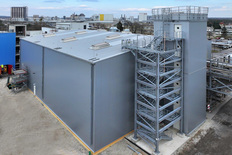- The prototype plant processes end-of-life lithium-ion batteries and production scrap.
- Valuable metals recovered include lithium, nickel, cobalt, manganese, and copper.
- The battery recycling plant for black mass production will start operations later this year.
- BASF aims to establish a commercial-scale refinery in Europe in the next years.

Prototype Metal Refinery
BASF has initiated operations at its prototype metal refinery for battery recycling in Schwarzheide, Germany. This advanced facility focuses on developing operational procedures and optimizing innovative recycling technology. It processes end-of-life lithium-ion batteries and battery production scrap, aiming to recover valuable metals such as lithium, nickel, cobalt, manganese, and copper.
Strategic Importance
The prototype refinery is a significant step in establishing Europe’s first co-located center for battery materials production and recycling. It complements BASF’s existing cathode active materials plant and the upcoming battery recycling plant for black mass production, scheduled to start operations later this year. This initiative aligns with the EU Battery Regulation, enhancing Europe's self-sufficiency in critical battery raw materials.
Sustainability and Circular Economy
Battery recycling is crucial for the sustainability of electric vehicles, as recycled metals have a significantly lower carbon footprint. Dr. Daniel Schönfelder, President of BASF’s Catalysts division, emphasizes that the extracted metals will support a local circular economy for the battery value chain, providing competitive and sustainable access to critical metals amid the expected rapid growth of the electric vehicle market.
Future Plans
BASF is committed to scaling up its metal refining technology, with plans to establish a commercial-scale refinery in Europe in the coming years. This will bolster BASF’s presence in Europe, complementing a robust collection network for end-of-life batteries and production scrap, black mass production, and battery materials production. These efforts aim to accelerate the transition to circular electromobility and support the development of a sustainable battery materials ecosystem in Europe.

